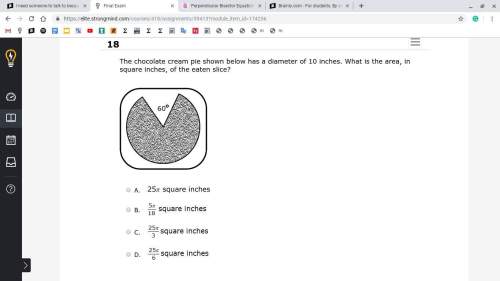
Mathematics, 06.05.2020 05:15 ddavid9361
Let F(x) = e^(1.2x) + sin^2x + ln(x+0.2) + 3 and let G(x) = x^6 - 1.2x There are three solutions to the equation F(x) = G(x). The first solution is -0.1736 and the third solution is 12.7132. Find the missing solution.

Answers: 2
Another question on Mathematics

Mathematics, 21.06.2019 20:30
Does the function satisfy the hypotheses of the mean value theorem on the given interval? f(x) = 4x^2 + 3x + 4, [−1, 1] no, f is continuous on [−1, 1] but not differentiable on (−1, 1). no, f is not continuous on [−1, 1]. yes, f is continuous on [−1, 1] and differentiable on (−1, 1) since polynomials are continuous and differentiable on . there is not enough information to verify if this function satisfies the mean value theorem. yes, it does not matter if f is continuous or differentiable; every function satisfies the mean value theorem.
Answers: 1

Mathematics, 21.06.2019 21:00
The area of a rectangle is 10 cm^2. one side of the rectangle is x cm. express the perimeter of the rectangle in terms of x and show that this rectangle cannot have a perimeter of 12 cm. the perimeter of the rectangle in terms of x is __ cm
Answers: 1


You know the right answer?
Let F(x) = e^(1.2x) + sin^2x + ln(x+0.2) + 3 and let G(x) = x^6 - 1.2x There are three solutions to...
Questions


Mathematics, 07.09.2021 04:20


Mathematics, 07.09.2021 04:20

Spanish, 07.09.2021 04:20

Mathematics, 07.09.2021 04:20

Biology, 07.09.2021 04:20






History, 07.09.2021 04:20

Mathematics, 07.09.2021 04:20





Mathematics, 07.09.2021 04:30

Mathematics, 07.09.2021 04:30




